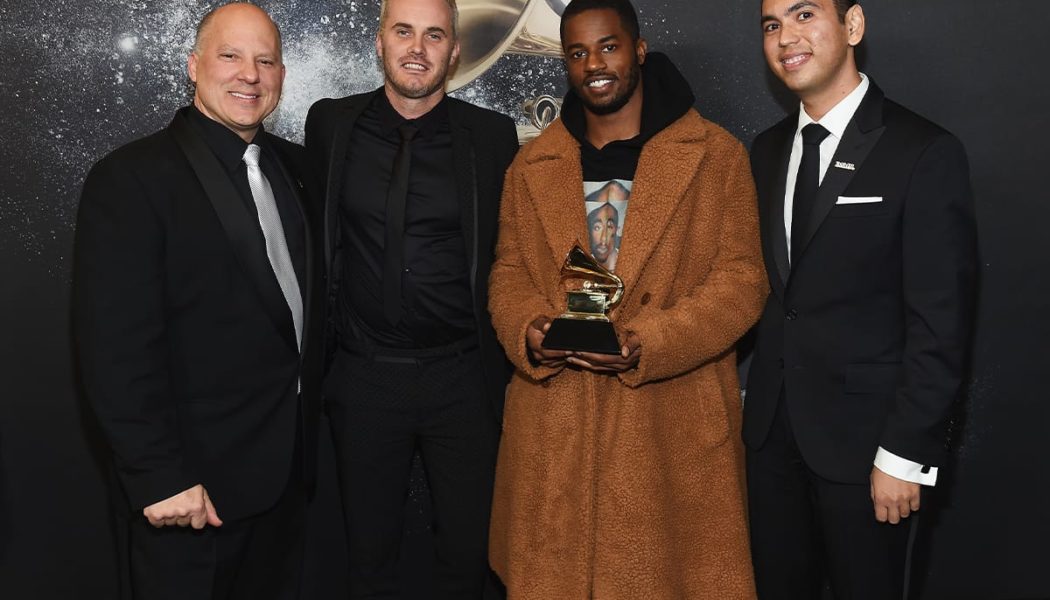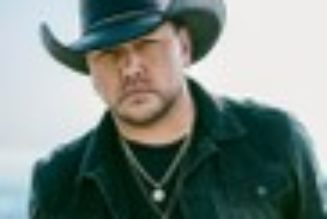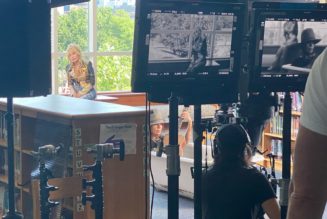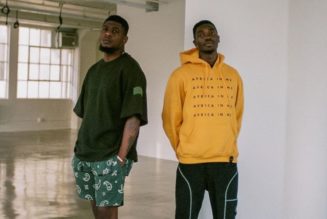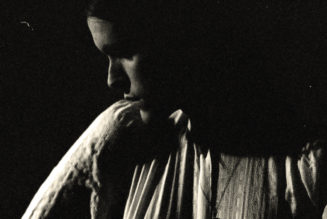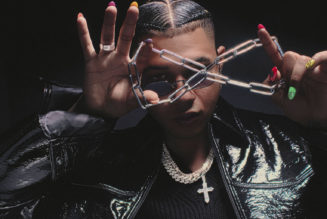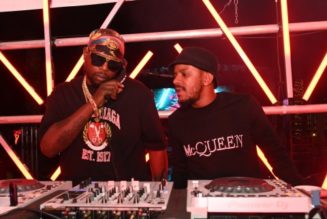Jason Baum’s chance to combine his love for music with his love for video was serendipitous. Savoring this opportunity, however, is what led him to work with some of modern music’s biggest and most respected artists.
It’s been 12 years since the Hawaiian filmmaker began his current career as a producer, but his work stems all the way back to 2004, when he started as a production assistant, then became a production coordinator before eventually landing a role as supervisor/manager. But Baum always had a strong artistic inkling, and spent his teenage years painting, learning darkroom photography processing, building websites in HTML and teaching himself how to use Photoshop. He thanks his high school’s strong technology department for exposing him to all these various mediums — and with his sense of creativity and a short film he made over winter break, he landed a spot in film New York University’s film program. “I figured that I would give it a shot and find out what [NYU] saw in this film I made,” he recalls. “Once I was [at NYU] and once I interned on some professional sets, I started to realize that producing was an interesting career.”
“If you can’t handle the stress of something with low stakes, I would suggest not getting into producing as it’s a very high-stakes, high-pressure job.”
As a big admirer of music videos, falling into that realm didn’t seem too far off. Baum reveals, however, that his career path was formed by chance more than anything else. He wanted to spend his summer interning for a place that he cherished, so he reached out and landed a stint at a production company run by one of his favorite directors. He finished his undergraduate studies and kicked off his career with these connections, leading him to his first big job with Sia and, eventually, producing for Dave Meyers (who he actually interned for), Emmanuel Adjei and Hiro Murai as they helmed the music videos of Childish Gambino, Beyoncé and, most recently, Kendrick Lamar. For the Compton rapper’s current Mr. Morale & the Big Steppers album cycle, he produced the videos for “Count Me Out” and “The Heart Part 5,” but his collaborative relationship with both Meyers and K-Dot began in 2017 , when Meyers brought Baum into the fold to help work on DAMN.. “It was a full circle moment, since [Meyers] was the main inspiration for my music video career,” Baum tells Hypebeast.
In three words, how would you describe your job to someone who isn’t familiar with the music industry?
Unimaginable problem solver.
Can you run us through a day in your work life?
No day is really the same. If I’m not on set, the day usually begins with assessing my inbox. Inevitably, there’s a fire to put out on a project, and then you have incoming work inquiries as well a treatment to read or something to budget out. Often someone is trying to collect on a past due payment, which has fallen on you to rectify. The goal is to spend the least amount of time dealing with new tasks so you can tackle what was originally on your to-do list and not get distracted by whomever starts calling you after 10 a.m. There is also going to be a Zoom call somewhere in there, but maybe a coffee or a lunch with someone too.
Your portfolio includes work with some very big names like Beyoncé, Childish Gambino and Jhené Aiko. How does a producer land these projects?
A producer normally has to land the director first. Artists usually don’t care who is producing their video, so they rely on the director to pick someone they like. I try to network with directors that I like, but to be honest, most of my work is for people I have known since the beginning of my career. I’m just thankful that these people are working with the coolest artists.
As someone who works extensively with a number of creatives — ranging from the artist themselves to the crew — is there a major switch in your mindset on each project?
Every project has a different dynamic or ecosystem of how the collaborators want to work. It also depends on if the people involved are working together for the first time or if there is an established workflow. If it’s the first time, it can take the entire project to really understand how people operate. I would say that the main nuance that I’m looking for when working with someone new is how much they want all of the details. Some people need details for context, but some just want results.
“The music industry is probably one of the most chaotic places to work. There are so many different personalities and constant changes, so you can only weather it if you don’t let it get the best of you.”
Can you tell us the story of your first big job?
It’s hard to define what really was my first big job. When I was just starting out, every job felt like my first big one because each gig just kept growing in profile and budget. Maybe you could call my music video for “Alive” by Sia as my first big job? It was a real A-List pop star with a decent budget and for an album’s lead single. It was a dream job as we had to film in Japan. Sia was also co-directing and we really hit it off while working overseas. Doing that video led me to so many other bigger things, including an even more massive video for her song “The Greatest.”
Did you always know you wanted to have the career you do now, and did school play any part in inspiring you to this path?
I always knew that I wanted to be an artist in some form. I loved reading and thought I could be an author. I painted, learned dark room photography, built websites in HTML and taught myself Photoshop when I was a teen. My high school had a strong technology department which exposed me to all of these various mediums. When it came to applying for college, I just thought I would apply to schools that had programs in all of these disciplines that I loved and see what stuck. I was very surprised when I was accepted into New York University’s film program based on a short film that I made over a winter break. Once I was there — and more so once I interned on some professional sets — I started to realize that producing was an interesting career. Then I discovered that I was pretty good at it and had some qualities that made it a natural fit for my personality.
“Reliability is the most important trait for any position in the music or film industry. No one wants to micromanage.”
What are the necessary first steps someone should take to enter a career in music as a video producer?
I would start by just planning anything, like a party or an event, and see if you like doing that. If you can’t handle the stress of something with low stakes, I would suggest not getting into producing as it’s a very high-stakes, high-pressure job. The best thing to do is to be a production assistant on as many shoots as you can. That way you can be exposed to what everyone does on a set. If producing still seems like the most interesting to you, find an up-and-coming director working on small projects and offer to produce for them. You’ll probably have to do a few jobs for free to make the offer appealing, and just build your network from there. Hopefully you did a good job and more offers with bigger budgets will keep coming your way.
What lessons and/or work ethics did you only pick up after working in the music industry?
The industry has forced me to stay patient and calm under pressure. The music industry is probably one of the most chaotic places to work. There are so many different personalities and constant changes, so you can only weather it if you don’t let it get the best of you.
What was the biggest challenge you’ve had to face so far, and how did you overcome it?
It is very easy to forget the biggest challenges of a project because they’re usually resolved in lackluster ways. Most of the time it has to do with something like a talent or location dropping out at the last minute. But, more times than not, this results in something better for the creative. Plus, it wouldn’t be healthy to dwell in the “what if” or the emotions that you had in the moment. So, the best way to overcome a big challenge is to just take a deep breath and dive in. Trust that you’ll make it to the other side.
What is one thing about your job that most people would find unexpected or surprising?
I think everyone thinks that the artists become your best friends after working with each other, especially if you’ve done multiple projects with them. Most of my interactions with artists can be reduced to a single sentence: “Hello, it’s a pleasure to be working with you.”
Is there a secret to career longevity in this industry?
Reliability is the most important trait for any position in the music or film industry. No one wants to micromanage. They just want the job completed with the least amount of stress.
“In the next five years, the music industry is going to have to re-evaluate income sources. Artists need to retain more ownership and income from streaming.”
What are some habits you follow regularly to always maintain a good headspace for work?
Sleep is the most important habit. If you fall off even one night, it’s hard to recover. Also, a good hot shower — and don’t forget to eat.
What does a day off look like for you?
When I’m deep in a project, it can be hard to watch anything. So a good day off is some Postmates, never leaving the couch, and binging a TV series in my pajamas.
How do you see your job evolving with the music industry in the next five years?
I think in the next five years, the music industry is going to have to re-evaluate income sources. Artists need to retain more ownership and income from streaming. At the same time, I think music marketing is becoming more and more visual. It wouldn’t surprise me if more artists started retaining a producer or content creator on their team.
If not working as a video producer in music, what would you be doing?
I would be running a juice bar on a beach.
Stay tuned for more features with music industry professionals — from managers to sound engineers, stagehands and others; the people who make the music world go round without standing behind a microphone.
